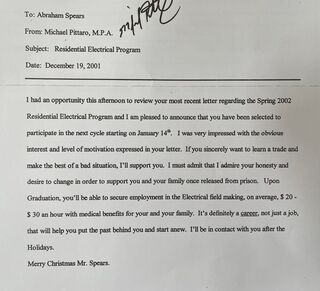Cognition
Ex-Prisoners Deserve a Second Chance
Rehabilitation and redemption are integral concepts to criminal justice reform.
Posted April 25, 2022 Reviewed by Ekua Hagan
Key points
- Formerly incarcerated persons deserve a second chance to prove they can become productive members of society.
- Overcoming barriers to employment, education, and housing are paramount to successful reintegration.
- To reduce recidivism, obtaining and maintaining sustainable employment after being imprisoned is a strong protective factor.
- Evidence-based practices support the importance of prison programming in preparing prisoners for reentry.
On March 31, 2022, President Biden signed Proclamation 10362 declaring April as “Second Chance Month." As stated in the proclamation: “America is a nation of second chances, and it is critical that our criminal and juvenile justice systems provide meaningful opportunities for rehabilitation and redemption.”
Partisan politics aside, as American citizens, we must admit that reformation of our criminal justice system is long overdue. Republicans and Democrats agree, albeit for different reasons, that our criminal justice system is flawed, deficient, and in immediate need of reform. Therefore, Proclamation 10362 is a much-needed positive step in the right direction.

"The Incarceration Nation"
The United States has unfortunately been labeled the “incarceration nation” because we have the reputation of having a mere 5% of the world’s population, yet 25% of the world’s prisoner population. Annually, nearly 650,000 individuals are released from our nation’s state and federal prisons. This figure does not consider the nearly 12 million individuals annually who enter and exit our nation’s jails. More than 90% of those sentenced to prison will be released one day.
In short, nearly 70 million Americans have a criminal record which creates significant barriers to obtaining and maintaining sustainable employment. In addition to overcoming several hurdles to economic stability, there are dozens of legal and regulatory restrictions preventing or altogether barring formerly incarcerated persons from obtaining housing, voting in our nation’s elections, pursuing an education, obtaining a business license, and so many other opportunities that most of us, quite honestly, take for granted.

Conflicting viewpoints
Being the realist that I am, I am not naïve in thinking that there are some reading this post who are not necessarily moved by the idea of second chances. In a nation heavily divided on so many important social issues, this is clearly one of them. Conservatives, on one hand, are likely thinking, "Well, there are lifelong consequences to our actions. Therefore, when you cross the proverbial line from law-abider to law-violator, you must be held accountable, and if those consequences include encountering barriers to employment, housing, education, etc., so be it." Those who tend to lean toward the liberal left undoubtedly support the notion of second chances, which wholeheartedly embrace the reformative concepts of rehabilitation and redemption.

I can honestly say that I genuinely appreciate and acknowledge both sides of the argument. However, the reality of the situation is that formerly incarcerated persons who do not have access to sustainable employment, suitable housing, and education are at a much higher risk of reoffending. That is why I prefer to view this issue from a perspective that is more pragmatic, reasonable, and sensible. This is our nation’s reality; therefore, if we want to truly reform our nation’s criminal justice system, we need to embrace and support the belief that most, but not all formerly incarcerated persons, are deserving of second chances.
For the most part, I support the old adage, “Do the crime, do the time," but what I am questioning here is, what happens after the individual has done their time and essentially, paid their debt to society? This is where the concept of second chances comes into play.

A success story
Case in point: I recently heard from a former prisoner whom I had not seen since 2001 when I was still working in corrections. At that time, I served as the prison’s director of treatment programs. I created a pilot program to provide vocational training in the form of an electrician’s certification program in coordination with a local vocational school. The prison paid for the tuition, tools, books, and everything else imaginable, which at the time, I believe, was a $7,000 investment into each of the program’s participants. Those interested in the program had to apply and meet certain, non-negotiable, criteria that included having a positive psychological evaluation, no institutional misconduct reports, a lengthy interview with me, and being within a year of parole eligibility. Those who were convicted of certain crimes of violence, including sex crimes, were not eligible to apply.
Abraham Spears is one of the many successful graduates of that program, who, since graduating from it, continues to serve as a licensed electrician who owns his own business. In his own words, here is what Abraham had to say after being granted a “second chance”:
“I thank my God, and Jesus Christ. Words cannot express the gratitude and appreciation for the never-ending gift that I was given so many, many years ago. There is no way that I can express to you, the reader, the lifeline that was given to me to obtain a second chance to become a son, husband, father, grandfather, uncle, and friend. However, most importantly, to be given the opportunity to become a productive member of society. It was not easy having any semblance of hope based on the choices that I had made leading up to my incarceration. It was a dark, very dark time in my life; however, I saw the opportunity that I deserved. I was persistent with my request slips to Dr. Pittaro and other staff members. Dr. Pittaro always responded, which gave me hope. I knew that I had gotten his attention, even though I wrote to him over the span of a year. I expressed to him the desire to change my life and I kept my word.”

Abraham, like so many others before and after him, was provided with the lessons, resources, and guidance needed to successfully reintegrate into society. He, like so many others, has paid his debt to society and has become a productive, contributing member of society. The “lock ‘em up and throw away the key" mentality, which we largely embraced in the 1980s and 1990s, is an antiquated way of thinking and acting, particularly if we genuinely want to move forward as a nation with criminal justice reform.


